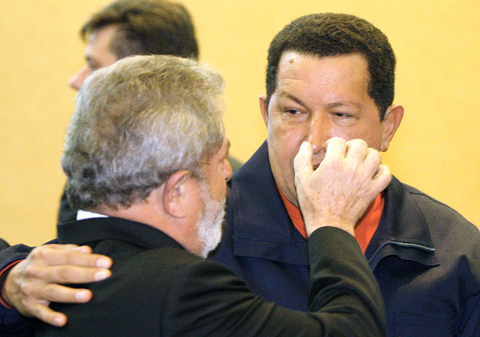Venezuelan President Hugo Chavez said on Saturday he was restoring Venezuela’s ambassador in Washington, voicing hopes for a “new era” in relations after barely getting to know US President Barack Obama at a regional summit.
Venezuela’s socialist leader told reporters at the Summit of the Americas that he would propose Roy Chaderton, his current ambassador to The Organization of American States, as its new representative in a move toward improving strained ties with Washington.
The announcement crowns a week in which Obama rejected 200 years of US “heavy-handedness” toward Latin America and raised the highest hopes ever for a rapprochement with Cuba, with which it severed ties 48 years ago.

PHOTO: REUTERS
Chavez expelled the US ambassador to Venezuela, Patrick Duddy, in September in solidarity with leftist Bolivian President Evo Morales, who ordered out the top US diplomat in his country for allegedly helping the opposition incite violence.
Washington reciprocated by kicking out ambassadors from both nations.
Chavez announced his decision after a day of exchanges with US Secretary of State Hillary Clinton and other US diplomats at a summit in Trinidad and Tobago.
A State Department official said Chavez approached Clinton during the summit sessions on Saturday and the two discussed returning ambassadors to their respective posts in Caracas and Washington.
Clinton “welcomes this development, and the State Department will now work to further that shared goal,” said the official, who spoke on condition of anonymity because of the sensitivity of the discussions.
The Americas director of the Carter Center, Jennifer McCoy, called Chavez’s announcement “surprising, but a very positive outcome of the summit.”
She said Chavez may have realized he had little choice but to try to improve ties with the US given Obama’s overwhelming popularity in Latin America and elsewhere.
“He can still criticize US policy,” McCoy said. “But it is much more difficult to criticize Obama the man.”
Chavez had stormy relations with the former US administration and once likened President George W. Bush to the devil, but he has warmed to the new US president at the summit, though Obama has been critical of him for his alleged harboring of and financing Colombian rebels.
On Saturday, Chavez gave Obama a book about foreign exploitation of Latin America and repeated in English during a luncheon speech what he told the US president the previous night at their first meeting: “I want to be your friend.”
Chavez told reporters that he’d instructed his foreign minister, Nicolas Maduro, to begin the process of making Chaderton his new US ambassador.
“He’s my candidate,” Chavez said. “We have to wait for the United States to give the appropriate acceptance.”
At the 34-nation summit’s inauguration on Friday, Obama won repeated applause with his promise to be an equal partner in the region and expressed his desire for a “new beginning” with Cuba, which has been suspended from the summit for 47 years.
Chavez has led the charge for demanding that Cuba be reinstated and praised Obama’s Friday night speech.

The CIA has a message for Chinese government officials worried about their place in Chinese President Xi Jinping’s (習近平) government: Come work with us. The agency released two Mandarin-language videos on social media on Thursday inviting disgruntled officials to contact the CIA. The recruitment videos posted on YouTube and X racked up more than 5 million views combined in their first day. The outreach comes as CIA Director John Ratcliffe has vowed to boost the agency’s use of intelligence from human sources and its focus on China, which has recently targeted US officials with its own espionage operations. The videos are “aimed at

STEADFAST FRIEND: The bills encourage increased Taiwan-US engagement and address China’s distortion of UN Resolution 2758 to isolate Taiwan internationally The Presidential Office yesterday thanked the US House of Representatives for unanimously passing two Taiwan-related bills highlighting its solid support for Taiwan’s democracy and global participation, and for deepening bilateral relations. One of the bills, the Taiwan Assurance Implementation Act, requires the US Department of State to periodically review its guidelines for engagement with Taiwan, and report to the US Congress on the guidelines and plans to lift self-imposed limitations on US-Taiwan engagement. The other bill is the Taiwan International Solidarity Act, which clarifies that UN Resolution 2758 does not address the issue of the representation of Taiwan or its people in

US Indo-Pacific Commander Admiral Samuel Paparo on Friday expressed concern over the rate at which China is diversifying its military exercises, the Financial Times (FT) reported on Saturday. “The rates of change on the depth and breadth of their exercises is the one non-linear effect that I’ve seen in the last year that wakes me up at night or keeps me up at night,” Paparo was quoted by FT as saying while attending the annual Sedona Forum at the McCain Institute in Arizona. Paparo also expressed concern over the speed with which China was expanding its military. While the US

SHIFT: Taiwan’s better-than-expected first-quarter GDP and signs of weakness in the US have driven global capital back to emerging markets, the central bank head said The central bank yesterday blamed market speculation for the steep rise in the local currency, and urged exporters and financial institutions to stay calm and stop panic sell-offs to avoid hurting their own profitability. The nation’s top monetary policymaker said that it would step in, if necessary, to maintain order and stability in the foreign exchange market. The remarks came as the NT dollar yesterday closed up NT$0.919 to NT$30.145 against the US dollar in Taipei trading, after rising as high as NT$29.59 in intraday trading. The local currency has surged 5.85 percent against the greenback over the past two sessions, central